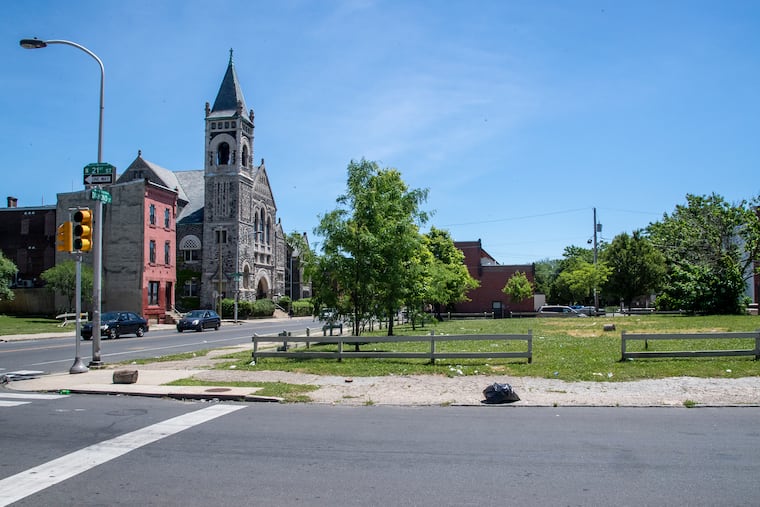Philadelphia Historical Commission decision to approve controversial 22nd Police District upheld in appeal
The project still has to go through the zoning process.

A proposal to build a new station for the 22nd Police District in the heart of North Philadelphia’s Diamond Street Historic District has cleared another hurdle despite resident opposition.
A three-person panel of the Board of License and Inspection Review, which hears appeals on decisions made by several city agencies and boards, including the Philadelphia Historical Commission, upheld a May decision Tuesday night approving tweaked plans for the proposed police station. The adjustments introduced late spring included a new Police Athletic League center incorporated in its design.
“Our authority at the board review is to determine if the historic commission followed its rules and procedures,” said board chair Kenneth Woodson. “If they’ve done that, then our hands are tied. We do not get to second guess the commission in terms of decisions that it makes.”
Tuesday’s decision is the latest in a yearslong battle over what happens to empty lots on the 2100 block of Diamond Street and where a new police station should go given its current location’s rundown shape. The city wants to build a $32 million, 30,000-square-foot multipurpose facility that serves as a new police station for the 22nd District and incorporates an outdoor public space as well as a PAL center where police and young people could take part in sports and educational activities.
Supporters, which include outgoing City Council President Darrell Clarke, have argued the neighborhood is in need of recreation space for young people and the location would allow police to respond to calls faster. What’s more, that space has remained empty for about 20 years attracting litter.
Critics of the plan point to the district’s designation on the Philadelphia Register of Historic Places, which it received in 1986. They say a police district would not match the character of the neighborhood and could be built elsewhere. Opponents of the plan say they would prefer to see the property used for new housing.
Judith Robinson, a homeowner and former leader of the 32nd Ward RCO, has been one of the most vocal opponents of the project. When the Historical Commission approved the amended proposal for the station, reversing a rejection of an earlier version of the plan that didn’t include the PAL center, she filed for an appeal. On Tuesday, Robinson sought to postpone the hearing so residents could acquire an attorney. That continuance was denied with Leonard F. Reuter, senior attorney with the city, arguing the 32nd Ward RCO is currently nonexistent — it failed to properly register this year— and that Robinson had since the summer to find an attorney.
Jon Farnham, director of the Historical Commission, told the panel the commission is limited to making decisions over the exterior of the building, not the interior or use — the latter would be a zoning matter. When explaining why the commission changed its initial decision Farnham said the initial design “was a wholly different application” with a different design and different materials inspired by the buildings in the historic district.
In her final plea to the panel, Robinson said there’s not much economic development in the neighborhood but argued the historic corridor is residents’ “ticket to ride.”
“We just want to say please allow us an opportunity to keep our historic corridor. It’s very important to the history of Philadelphia, it’s very important to the history of the black community,” she said.
The panel voted 3-0 upholding the commission’s decision. Robinson could appeal the decision in the Court of Common Pleas but the project still has to go before the Zoning Board of Adjustment for a variance. The hearing is scheduled for Dec. 19